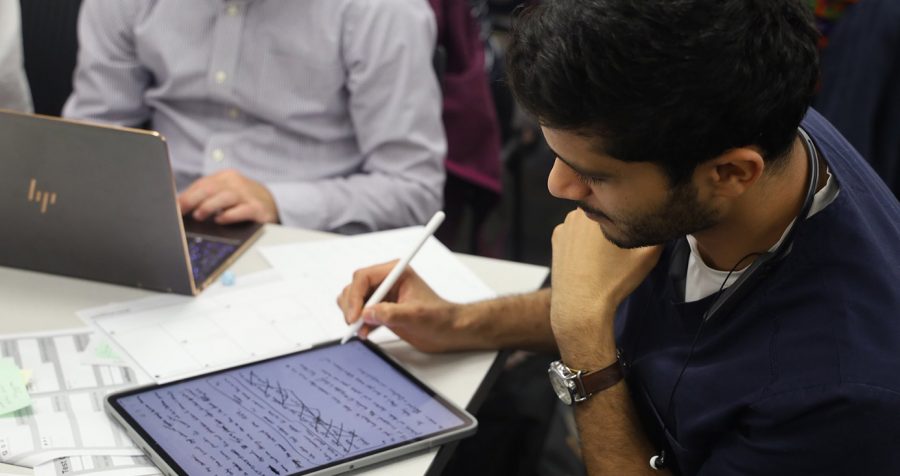Pitt dental student creates product to fight tooth decay
Image via University of Pittsburgh
Sohail Rana, who is in his last year as a dental student, and his team started working together in early January 2020 and officially formed their startup company — ZeroDK — in May 2020. ZeroDK, a pun on the phrase “zero decay,” combines the use of a toothbrush holder with a smartphone app that tracks how long users brush and floss their teeth.
April 5, 2021
The contribution of poor oral hygiene to tooth decay concerned Sohail Rana while studying at Pitt’s School of Dental Medicine, leading him to tackle this problem with technology.
Rana, who is in his last year as a dental student, and his team started working together in early January 2020 and officially formed their startup company — ZeroDK — in May 2020. ZeroDK, a pun on the phrase “zero decay,” combines the use of a toothbrush holder with a smartphone app that tracks how long users brush and floss their teeth.
“ZeroDK’s mission is to use technology to provide assistance to people to support oral hygiene and oral care,” Rana, co-founder and chief executive officer, said. “The number one problem in dentistry that people face is the lack of access to care. We want to tackle that by giving people the tools to monitor their oral hygiene because that is the driver of dental decay.”
According to Rana, ZeroDK encourages a small change of habit related to oral-hygiene behavior to prevent high costs and pain for patients in the future.
“It takes five years for decay to start happening,” Rana said. “[ZeroDK] contains the behavior and makes a slight modification to help people prevent so much cost and so much pain by just slightly modifying their routine.”
The iPhone app is out now for the beta testers — those who will test out the app for the first time — and they will receive their toothbrush holders in late May or early June. ZeroDK will release its app to the public by the end of April and make the device available to the public for preorder later this year, according to Rana.
The ZeroDK team is currently printing 3D toothbrush holders and having the [printed circuit board] manufactured overseas for the beta testers. Rana said the holder will eventually be injection-molded, a process for producing parts by injecting molten material into a mold.
“Right now, we’re manufacturing [the toothbrush holder] ourselves. We’re having the PCB be manufactured overseas and that gets shipped to us. For the beta testers, we’re 3D-printing the holder,” Rana said. “At scale, it’s going to be injection-modeled and the PCB will be fully customized.”
The ZeroDK team is conducting market research to figure out a retail price for its product. While the device production is not currently scalable to millions of units, the toothbrush holder currently costs $20 a unit to produce. Eventually, Rana said ZeroDK could get its production cost down to under $10 a unit.
As a co-founder and CEO of ZeroDK, Rana said he does a little bit of everything on the team.
“I do everything. I do a little technology, I do a little bit of marketing, I talk to our software developer and I work in development as well,” Rana said. “Any entrepreneur has to wear a lot of hats, especially a co-founder. You’re wearing every sort of hat and you have specialists in the field, ideally on your team, that help the business.”
Along with Rana, the ZeroDK team also includes Muntaser Syed, Zac Colimon, Sahara Muhina and Adrian Reitars.
Colimon, ZeroDK’s hardware engineer, got involved with ZeroDK when he went to Pitt’s Big Idea Blast last year, a one-day pitch competition run by the Big Idea Center. Colimon said he worked with ZeroDK during the competition, then joined the team a week later. During his time on the team, Colimon said the biggest challenge has been designing for scale.
“The biggest challenges I’ve faced come from designing for scale,” Colimon, a sophomore computer engineering major, said. “Everything we make has to work over and over again even with minor variations from device to device. This is the biggest technical challenge I’ve encountered.”
Others on the ZeroDK team, such as Reitars, also faced challenges regarding the scale of production. Despite this challenge, Reitars, ZeroDK’s chief product officer and a co-founder, taught himself how to design electronics that can be scaled efficiently.
“We had to scale up production of our electronics, which involves designing and building printed circuit boards,” Reitars, who graduated from Pitt in 2019, said. “Since we don’t have any electrical engineers on our team, I stepped up and taught myself how to design electronics that can be scaled in an efficient manner.”
Muhina, ZeroDK’s software developer, taught herself advanced programming to help the team.
“We knew that what we were building was a smartphone app that would essentially serve as the companion to the smart holder. As a novice programmer, I had to quickly learn how I could help the team get to that goal,” Muhina, a junior computer engineering major, said. “We’ve had to pivot a couple of times, but that has helped us become more resilient as a team.”
Rana said he is proud of how the ZeroDK team has managed to develop its product remotely during the pandemic.
“We’ve done well,” Rana said. “We were still able to develop a hardware product remotely, which is really difficult to do. Doing software remotely is not as challenging as the hardware, and our solution is hardware plus software.”








